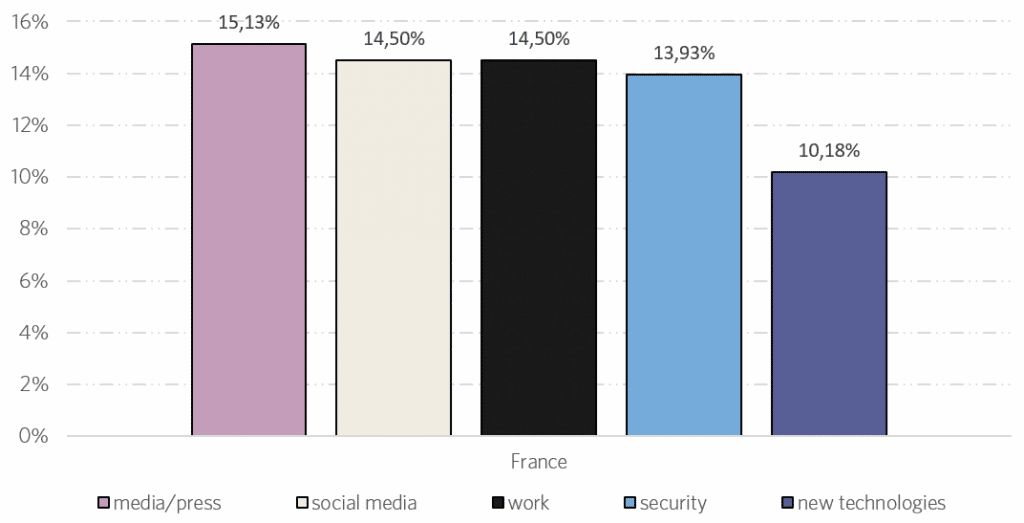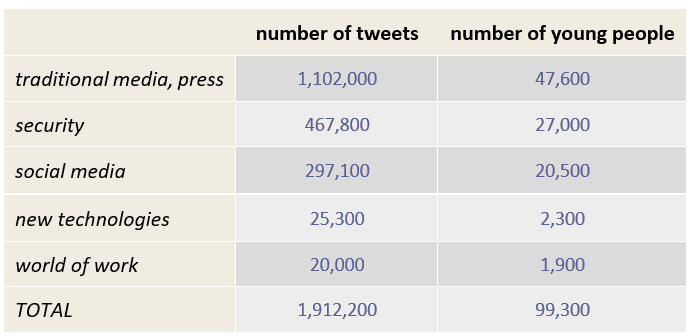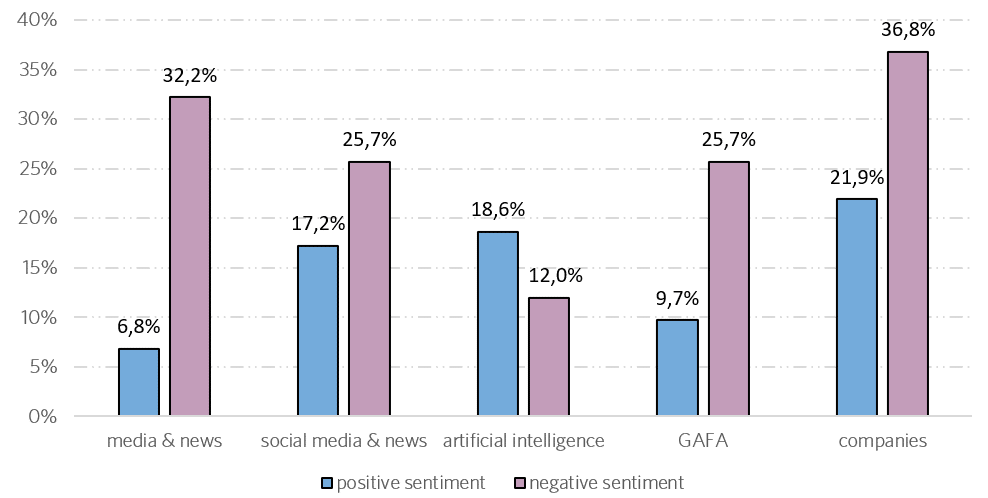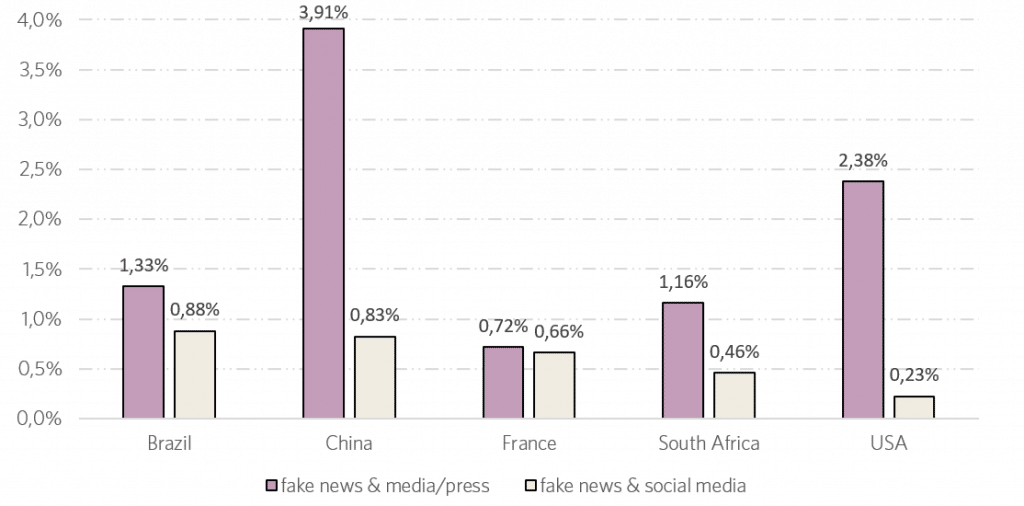This analysis gathers and delves deeper into the French data presented in the EYES 2021 (Emergy Youth Early Signs) report on the emerging concerns of 18- to 24-year-olds of five nationalities: Brazilian, Chinese, American, French, and South African.
The EYES 2021 report published in February 2022 sought to analyse the perceptions of 18- to 24-year-olds from the five countries in which SKEMA Business School operates, on five political issues prioritised by young people in that age group: traditional media and the press, social media, security, new technologies, and the world of work. The report is the fruit of qualitative interviews conducted with 36 SKEMA students (17 of which were French), and of social listening carried out on the Twitter platform between July 2020 and June 2021. The detailed methodology for this work is annexed to the EYES 2021 report.
What Are 18- to 24-year-olds Talking about on Twitter?
A little more than 9 million French youths use Twitter (Statista, July 2021). The 18 to 24 age group is rather well represented on this online platform, but their participation is uneven across themes. Like the youths of the other nationalities studied, they particularly engage in conversations about traditional media/the press and social media, representing 15% and 14.5% of users expressing an opinion on these topics. Their interest in topics relating to work and security is in a similar range, with 14.5% and 14% respectively. Surprisingly, the topic French youths are least inclined to discuss is new technologies. They represent just 10% of users taking part in these conversations.

In terms of number of tweets however, French youths buck the global trend: security is the second most popular theme, ahead of social media.

Are French Youths Disillusioned with the Future?
Across the five themes, the words ‘change’ and ‘future’ are very seldom used by French youths. Only 0.5% of their tweets across all themes include these words. In contrast, young Brazilians, South Africans and Americans use them nearly five times more. This attitude can be considered in relation to two surveys carried out in September and November 2021 respectively. In the first, conducted by OpinionWay for Le Figaro/L’Etudiant, 58% of 18- to 24-year-olds stated they were confident in the future of their generation. In the second, conducted by the market research and data analytics institute YouGov for the employment website Monster, only 49% could envision a positive future for themselves.
Whether used positively or negatively, the words ‘change’ and ‘future’ are theoretically indicators of envisioning the future; their lesser use in France should raise a red flag with politicians. Is it a sign of disinterest? Disillusionment? The timing of our survey, in the midst of a health crisis affecting all countries concerned, may be one reason for this positioning in the “here and now”, given the uncertainty around how the crisis would evolve. It could also indicate a lack of prospects for young people. This was the analysis of Kairos Future and Fondapol in a 2008 report, which was an invitation to “reconsider our perceptions of young people and break away from ineffective categorial public policy to instead adopt a policy in service of a new social project. Because, without a ‘collective myth’, young people tend to withdraw into themselves, with no hope for their society or for themselves.”
Distrust of Traditional Media: What is the Future of News?
During their interview at the beginning of the study, one French student explained that their generation’s distrust of the dominant media stemmed in particular from the lack of independence of the French media outlets, since these are “monopolised by a handful of millionaires”. In fact, in late 2021 the French Senate established a commission of inquiry to examine the state of media concentration in France and determine the impact of this concentration on democracy. According to this same student, social media platforms are considered a “resource dissenting from the information provided by traditional media” and thus they are the preferred news source of young people. Social media platforms are the playing field of new alternative media outlets such as Brut, Konbini, HugoDecrypte, etc. According to another SKEMA student, young people are more drawn to these new media because they find the often-younger journalists more relatable. News presented in the form of short videos is more popular, at a time when reading is less appealing and when minds are accustomed to having content constantly vying for their attention.
This loss of trust in traditional media is also expressed online. More than 32% of tweets containing the words ‘media/press’ and ‘news’ seem to be negative, while just 6% are positive. Also on Twitter, freedom of the press is a hot topic among French youths. ‘Freedom’ is the second most frequently used term within the traditional media/press theme. In comparison, while there is some degree of distrust in social media, it is less pronounced: when the terms ‘social media’ and ‘news’ are combined, 26% of tweets are negative and 17% are positive.

Combatting Fake News without Falling into the Censorship Trap
French youths are concerned about the proliferation of ‘fake news’, an expression they associate with the terms ‘traditional media’ and ‘social media’ equally, unlike the youths of other nationalities who use the term more, and sometimes a great deal more, in relation to the dominant media outlets. Might this result indicate a feeling among French youths that their national media do a somewhat better job of analysing and fact-checking information?
On Twitter, French youths spontaneously associate the State and the government with these discussions: of all the key words tested, this is the leading association in discussions on the traditional media/press and social media themes. These observations are consistent with elements of the discussions held with the French SKEMA students, who wondered about the ways governments must interfere with the news content circulating in their country. The feeling of manipulation was palpable, with balance between disinformation, regulation and censorship considered a major issue. Censorship, whether by the State or by private entities, does not appear to be the solution to the problem. On Twitter, French youths were very active in debates about freedom of speech and the censorship power of social media platforms after Twitter’s decision to ban Donald Trump from its platform in the aftermath of the Capitol invasion in January 2021. The hashtags #TrumpBan, #TrumpBanned, #TrumpTwitterBan, #JeSuisDonaldTrump (I am Donald Trump), and #TwitterCensure (Twitter censorship) punctuate these conversations.
These discussions illustrate that young people are vigilant with regard to censorship abuses. The students interviewed seemed to lean more towards education in critical thinking than regulatory measures. It seems crucial to introduce an information discipline in secondary education, and continue to teach these skills in higher education. Instruction in critical thinking skills, encompassing history, economics and philosophy, would provide students with a grounding in questioning, sorting and validating the information they receive. It seems all the more crucial to develop these skills given that social media tends to create information “bubbles” that keep people in echo chambers, exposes them to a substantial flow of information, and imposes a faster reading speed. The public authorities concerned should very seriously consider generalizing existing training to all from a very early age.

Security, a Crucial Area of Concern
Security is another hot topic on Twitter. With 467,800 tweets, it is the second most popular theme, far ahead of social media with its 241,200 tweets. This is true among French youths, but also the Chinese; the three other countries studied systematically prefer conversations about social media. This interest in security-related issues may be due in part to the events taking place within the country at the time of the study.
The parliamentary debate over the Global Security Bill in November 2020 is one of the most heavily discussed topics in that theme. #StopLoiSecuriteGlobale (stop global security law) ranks third and #PPLSecuriteGlobale (legislative proposal) sixth. These hashtags, combined with place names (#France, #Paris, #Lyon are all in the top 10) reflect the many demonstrations and acts of activism organised in protest of the bill. The article making it illegal to publish photographs of law enforcement officers was especially criticised. #police is the fifth most popular hashtag for this theme. While French youths predominantly associate security with the words ‘State/government’ (24,000 tweets), the next most common association is with the word ‘freedom’ (11,800 tweets).
Within the work groups composed of French SKEMA students, the question of physical security was especially raised by the women. Among other points, the latter wanted a more effective implementation of policies aimed at reducing sexist violence.
The issue of health security is also a major topic of conversation online. Over the period studied, punctuated by lockdowns and curfews, #COVID19 is the second most popular hashtag for this theme, with 5,900 occurrences. The SKEMA students questioned the declaration of a state of emergency: “Does the increasing recourse to the state of emergency dilute the concept of emergency in the minds of citizens? Does an emergency situation justify restricting individual liberties?”. Furthermore, they talked about the isolation and the integration challenges resulting from online study and from having to work from home during their internships. Teleworking as the new normal in companies appeared to be one of the major issues resulting from the pandemic. According to the Les jeunes et l’entreprise (youths and corporate) survey conducted by Fondation Jean-Jaurès in December 2021, a mere 12% of French youths aged 18 to 24 wanted to work from home full time. 42% preferred to work from home part time. Again according to Fondation Jean-Jaurès, “The workplace is not considered outdated or obsolete despite the emergence of teleworking and, now more than in the past, it must be a pleasant moment that provides something (an atmosphere).”
French youths seem to take a particular interest in the security of new technologies. The combination of the words ‘security’ and ‘AI/GAFA’, for example, appears four times more in the discussions of French youths than in those of young Americans, Chinese or Brazilians. French youths actually see artificial intelligence in a rather positive light. Close to 19% of tweets on the subject are positive, while 12% are negative.
GAFA Are All-Powerful and Rather Unpopular
With 2,900 tweets, #GAFA is the most widely used hashtag in France for the new technologies theme. They are criticized: more than a quarter of tweets mentioning them have a negative connotation. The question of trust garners particular interest and, unsurprisingly, complaints about the management of data are at the heart of conversations. Several of the French students who took part in the qualitative interviews shared their concerns over the use and protection of their personal information. They insisted on the lack of information provided to citizens about how their information is stored and used. They also wondered what role governments should play in regulating these companies.
Online, the most engaging debates regarding the issues and challenges of regulation primarily centre on freedom of speech and the censorship power of GAFA. Here again, the removal of Donald Trump’s Twitter account caused an uproar. For some, the power of Big Tech, as demonstrated during this event, constitutes a major threat to freedom of speech. #Trump is the 3rd most popular hashtag for this theme, #TrumpBanned the 4th, #censure (censorship) the 12th, and #trumpban the 19th, and yet all are absent from the top 10 of hashtags for this theme in the United States. Many tweets focus on the new balance of power between States and GAFA. At a time when decision-makers are deliberating over the fiscal and editorial rules to apply to the Tech Giants of the West, young people’s support for such measures is a major advantage.
Distrust in the Corporate World
French youths have a rather negative view of the corporate world. Nearly 37% of tweets containing the word ‘companies’ are negative, while 22% are positive. Youths in the 18 to 24 age group mainly discuss #salaires (salaries, 2nd most common hashtag for the work theme) matters of social and environmental responsibility (#greenwashing). The same trend can be found among Brazilian, American and South African youths; we provide an analysis of this in Youth at Work: Distrust of the Corporate World and Political Demands.
This trend is not new in France, either. In 2008, a study by the Centre d’études de l’emploi (Centre for Employment Studies) was already reporting an “attitude of distrust and scepticism toward the corporate world” among French people under the age of 30. Having existed for at least 15 years, this problem now appears critical and deserves the full attention of decision-makers. Substantive work on the very paradigms of attitudes toward work seems necessary.


